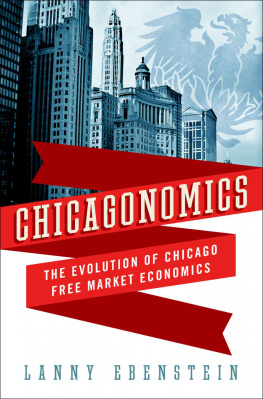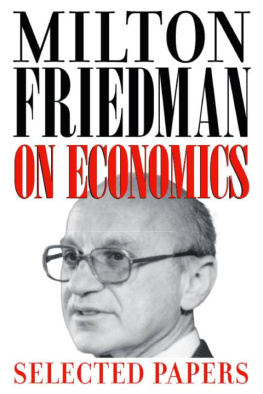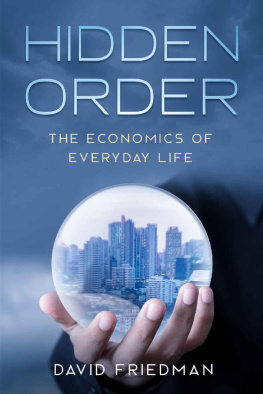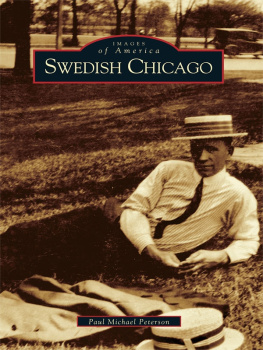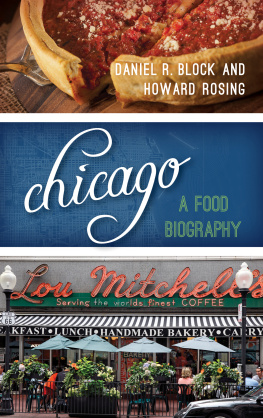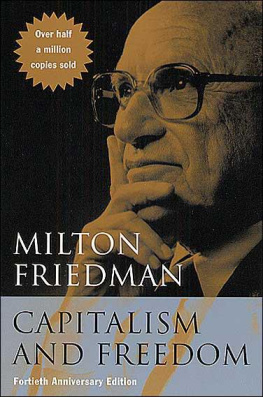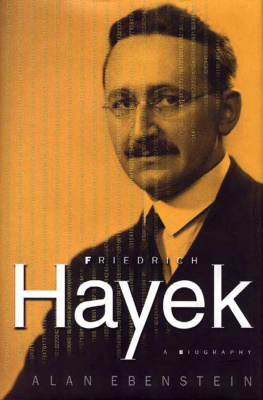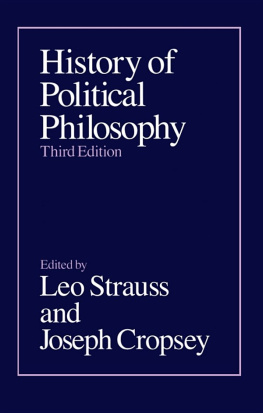Chicagonomics
The Evolution of Chicago Free Market Economics
Lanny Ebenstein

St. Martins Press
New York
Thank you for buying this St. Martins Press ebook.
To receive special offers, bonus content, and info on new releases and other great reads, sign up for our newsletters.

Or visit us online at us.macmillan.com/newslettersignup
For email updates on the author, click here.
The author and publisher have provided this e-book to you for your personal use only. You may not make this e-book publicly available in any way. Copyright infringement is against the law. If you believe the copy of this e-book you are reading infringes on the authors copyright, please notify the publisher at: us.macmillanusa.com/piracy .
The ideas of economists and political philosophers, both when they are right and when they are wrong, are more powerful than is commonly understood. Indeed the world is ruled by little else. Practical men, who believe themselves to be quite exempt from any intellectual influences, are usually the slaves of some defunct economist...
John Maynard Keynes
The General Theory of Employment, Interest, and Money
To Contemporary Libertarians
This work on the development of economic and political ideas emanating from the University of Chicago is my tenth book in the history of economic and political thought. I am pleased by the continuing gracious reception accorded these works. This is my fifth book specifically on Friedrich Hayek, Milton Friedman, or Chicago economics.
Times have changed much in the United States and internationally since I began this book in 2008. For this reason, I conclude with thoughts on the extension of the Chicago free market tradition in current circumstances. In a 1967 lecture on his former teacher and friend Henry Simons, Milton Friedman said: Critical examination of a mans ideas is a truer tribute than slavish repetition of his formulas. I therefore hope that the proposals offered here to achieve greater economic equality in the distribution of income and wealth in the United States through the restoration of progressive income and estate taxation will be looked on with interest and favor.
The policies recommended here are consistent with the contemporary application of traditional Chicagoan positive and normative economics. In many respects, I call for a return to earlier Chicagoans views on appropriate government and economic policy, particularly Simonss views on the importance of greater equality and progressive taxation. The policies advocated here are essentially those that existed in the United States in the postwar era through 1980, when America was considered to be at its apex, domestically and internationallyparticularly during the 1950s, when rates of progressive income taxation were highest.
In contrast to most previous scholarship, I distinguish between the younger and older Friedman and Hayek, and emphasize the radical, virtually neoanarchist positions that each took in his seventies and eighties, contrary to views they expressed earlier in their careers. Friedmans and Hayeks later views should be discarded for their younger and more moderate opinions. It is possible now to evaluate the careers of both with more distance, objectivity, and detachment than was possible even a few years ago. I hope that the distinction between the younger and older Friedman, in particular, will become standard in the literature. A number of authors, including Angus Burgin, Brian Doherty, and William Ruger, call attention to Friedmans progressive radicalization as he turned to policy advocacy.
I am very critical of contemporary libertarianism and to a lesser extent conservatism, though not, I hope, unreasonably or unfairly. I focus on streams of economic thought at Chicago with public policy emphases. Chicago economics has been most fruitful in its focus on public policy. Through the presentation of many economists ideas over centuries, together with critiques of them, I hope to make an independent as well as derivative contribution to classical liberalism and the theory of free market capitalism. As historically understood at the University of Chicago, classical liberalism and capitalism require a strong egalitarian element achieved through progressive income and estate taxation.
The Chicago economists on whom I focus most include J. Laurence Laughlin, Jacob Viner, Frank Knight, Henry Simons, Milton Friedman, George Stigler, Aaron Director, and Friedrich Hayek. The discussion of their predecessors, from Adam Smith to William Graham Sumner, sets the stage, and, I hope, with the bibliographical essay, offers an accurate perspective on Adam Smith, consistent with contemporary literature. I emphasize Hayek and Friedman because of their importance and my familiarity with them, and because I hope I have new things to say about their thought and development.
I thank those who provided interviews for my previous works, which I have incorporated here. I thank Lester Telser, Thomas Sowell, Sam Peltzman, Stephen Stigler, and Edwin Meese. I also interviewed Milton and Rose Friedman, Ronald Coase, Gary Becker, Allen Wallis, D. Gale Johnson, Larry Sjaastaad, Larry Hayek, and Arthur Seldon, all of whom have passed away. I exchanged correspondence with Paul Samuelson, James Meade, Robert Fogel, and others who have also passed away. I recently had the opportunity to interview George Shultz and talk with David Stockman. I have reviewed archives, particularly relating to Friedrich Hayek and Milton Friedman at the Hoover Institution on War, Revolution, and Peace at Stanford University.
In addition, I thank the many scholars who have plowed the same field, and from whose works I benefit, including Angus Burgin, Ross Emmett, J. Daniel and Claire Hammond, George Nash, Johan Van Overtveldt, Robert Leeson, Philip Mirowski, Robert Van Horn, Thomas Stapleford, Sherryl Kasper, Mark Skousen, Malcolm Rutherford, Donald Winch, Robert Skidelsky, and the late Warren Samuels and Henry Spiegel. My monthly breakfast associatesJohn Busby, Bob Casier, John Kay, Peter MacDougall, and Stan Rodenprovided helpful thoughts on the conclusion, as did my old professor Tom Schrock, Nelson Lichtenstein, and Jerry James. I would also like to thank Alan Bradshaw for his work on the manuscript. None of these good people is responsible for this works errors and inaccuracies, and many will disagree with the relative merits of classical liberalism, contemporary libertarianism, and contemporary conservatism presented. I hope to persuade, or be persuaded by, them.
Lanny Ebenstein
Santa Barbara, California
July 20, 2015
If we were to dig as deeply as possible into the temporal roots of Chicago free market economics, we would find some of the most important to be in the eighteenth century and first decades of the nineteenthin the works of the Scottish moral philosopher and economist Adam Smith (17231790) and the British political philosopher and founder of utilitarianism Jeremy Bentham (17481832). Both Smith and Bentham have dominated economic and political thought, and Bentham took much of his inspiration from Smith. Together with the great John Locke (16321704) and John Stuart Mill (18061873), Smith and Bentham were two of the four greatest economists and political philosophers in the original classical liberal line of Whig and liberal authors and thinkers in the late seventeenth through mid-nineteenth centuries.
With Smiths work, the fields of economics and political economy really come into view for the first time. There was, in Smiths work, an
Next page
